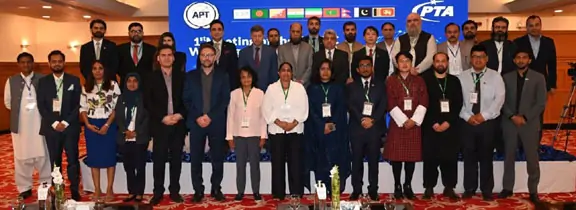Over the course of 10 insightful sessions, participants from various countries exchanged ideas and shared best practices, fostering a collaborative environment aimed at driving progress in the ICT sector.
Dr. Khawar Siddique Khokhar, Chair of the SATRC Working Group on PRS and Member (Compliance & Enforcement) of the Pakistan Telecommunication Authority (PTA), lauded SATRC as a model of regulatory collaboration.
He highlighted the importance of fostering sub-regional cooperation among SATRC member countries to achieve shared goals. Dr. Khokhar emphasized the meticulous execution of identified work items and the production of comprehensive reports that will guide future actions in the ICT regulatory sphere.
Major General (R) Hafeez Ur Rehman, Chairman of PTA, expressed his heartfelt appreciation to all the delegates and respective administrations for their unwavering dedication and collaborative efforts in advancing the objectives of the inaugural meeting of the SATRC Working Group on PRS. He underscored the significance of such gatherings in paving the way for coherent and unified regulatory practices across the region.
Hosted by PTA, the SATRC Workshop on PRS brought together delegates from the nine SATRC member countries, along with representatives from national and international organizations. ICT policy and regulatory officers from Afghanistan, Bangladesh, Bhutan, Iran, Maldives, and Sri Lanka attended in-person, while delegates from India and Nepal joined virtually.
The event served as a valuable platform for constructive dialogue and the exchange of ideas, paving the way for progress in the telecom/ICT sector across the region. Government bodies and local industry representatives from cellular mobile companies, local loop operators, and vendors also joined the meeting, contributing to the comprehensive discussions on regulatory policies.
Throughout the sessions, key topics included spectrum management, cybersecurity, and the promotion of digital inclusion. Delegates discussed the challenges and opportunities in each of these areas, sharing insights and strategies that have been effective in their respective countries. The exchange of knowledge and experiences was aimed at harmonizing regulatory approaches to foster a more integrated ICT landscape in South Asia.
One of the notable outcomes of the meeting was the emphasis on the need for a coordinated effort in tackling cybersecurity threats. Delegates highlighted the importance of developing robust cybersecurity frameworks that can protect the region’s digital infrastructure from emerging threats. There was a consensus on the necessity for continuous collaboration and information sharing to enhance the region’s collective cybersecurity posture.
Another significant area of discussion was the management of spectrum resources. Efficient spectrum management is crucial for the deployment of new technologies, such as 5G, which promise to revolutionize connectivity and drive economic growth. Delegates explored innovative approaches to spectrum allocation and the need for regulatory frameworks that can adapt to the rapid advancements in technology.
The promotion of digital inclusion was also a key focus, with discussions centered on bridging the digital divide and ensuring that all segments of society have access to ICT services. Delegates shared various initiatives and programs aimed at improving digital literacy and expanding connectivity to underserved and rural areas.
As the meeting concluded, there was a collective sense of achievement and a renewed commitment to working together to address the regulatory challenges facing the ICT sector in South Asia. The comprehensive reports and action plans developed during the meeting are expected to serve as a roadmap for future regulatory efforts, ensuring that the region can harness the full potential of ICT for economic and social development.
The SATRC Working Group on PRS has set a strong foundation for continued collaboration, and its efforts are poised to significantly influence the ICT regulatory landscape in South Asia in the coming years.
